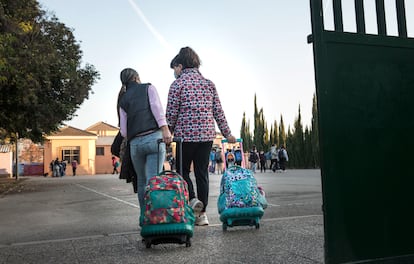Central government, Spanish regions to meet next week to discuss return to school in January
Given the spike in coronavirus infections, the Madrid regional government is considering a return to home-schooling for older students, while most other regions are not planning any major changes to protocols for now

Spain’s central government and regions will decide next week whether to revise the health protocols in the country’s schools, which are due to reopen on January 10. Next Tuesday there will be a meeting of the Health, Education and Universities ministries, along with regional education chiefs, to analyze the return to the classroom. According to sources from the executive, there are no plans for now to delay the return of students to class nor change current protocols, which include obligatory masks for the over-sixes. The vertiginous rise in coronavirus cases, however, mean that there could still be changes to prevention measures.
The central government believes that, in spite of the rise of cases registered in the last weeks of the first academic semester, the global impact on schools will continue to be low. Most cases were seen in elementary schools, where students were yet to be vaccinated. The campaign has, however, now moved on to this group and by yesterday, 25% of children aged five to 11 had received their first vaccine dose.
“The educational model of face-to-face teaching has been a success and is the Spanish government’s model, because classrooms are safe spaces,” said the health minister, Carolina Darias, this week.
For now only the Madrid region has stated that it is considering home-schooling for older students. The regional premier, Isabel Díaz Ayuso, said that the decision would be taken “a few days in advance.” The Catalan health chief, Carmen Cabezas, said she supported schools opening “normally” on January 10, a position that has also been adopted by her opposite number in the Balearic Islands, Patricia Gómez.
Regional premiers in Castilla y León, Castilla-La Mancha and Extremadura have also defended a normal return to school, while the health chief in Murcia, Juan José Pedreño, said that the “progress of epidemiological data” would have to be examined before a decision is taken. Galicia, Asturias, Cantabria and La Rioja are all planning on a normal return to school with no major changes.
The NGO Save the Children has called for the closure of schools due to coronavirus infections to be ruled out entirely or at least “to be the last resort.” The Madrid Regional Platform for Public Schools, which brings together the major teaching unions and other organizations in the education community, has also called for the new term to begin “safely and in person.”
The end of the first semester of the 2021-22 academic year ended with major issues in elementary schools. A record number of coronavirus outbreaks was recorded in December: 463. During the last week of class, 5,433 groups had been sent home to isolate, 1.3% of the total.
High schools fared much better, given that teenagers have mostly been vaccinated, according to experts. According to the protocols in place, close contacts of positive cases do not have to isolate, meaning that fewer classes had to be confined among these older students. That said, infections have been growing fast in the 12-19 age group, with the incidence on Tuesday coming in at 1,250 cases per 100,000 inhabitants over 14 days, compared to the national average of 1,360.
Epidemiologists believe that the immunity offered by the vaccines against infection is starting to wane among adolescents, although protection against serious illness is maintained. This, combined with the spread of the more-contagious omicron strain of the virus, means that the situation for high school students may be more complicated this coming semester.
Tu suscripción se está usando en otro dispositivo
¿Quieres añadir otro usuario a tu suscripción?
Si continúas leyendo en este dispositivo, no se podrá leer en el otro.
FlechaTu suscripción se está usando en otro dispositivo y solo puedes acceder a EL PAÍS desde un dispositivo a la vez.
Si quieres compartir tu cuenta, cambia tu suscripción a la modalidad Premium, así podrás añadir otro usuario. Cada uno accederá con su propia cuenta de email, lo que os permitirá personalizar vuestra experiencia en EL PAÍS.
¿Tienes una suscripción de empresa? Accede aquí para contratar más cuentas.
En el caso de no saber quién está usando tu cuenta, te recomendamos cambiar tu contraseña aquí.
Si decides continuar compartiendo tu cuenta, este mensaje se mostrará en tu dispositivo y en el de la otra persona que está usando tu cuenta de forma indefinida, afectando a tu experiencia de lectura. Puedes consultar aquí los términos y condiciones de la suscripción digital.









































